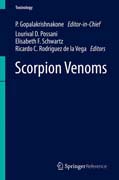
Scorpion Venoms
Gopalakrishnakone, P.
Possani, Lourival D.
F. Schwartz, Elisabeth
Rodríguez de la Vega, Ricardo C.
In recent years, the field of toxinology has expanded substantially. On the one hand it studies venomous animals, plants and micro organisms in detail to understand their mode of action on targets. While on the other, it explores the biochemical composition, genomics and proteomics of toxins and venoms to understand their three interaction with life forms (especially humans), development of antidotes and
exploring their pharmacological potential. Therefore, toxinology has deep linkages with biochemistry, molecular biology, anatomy and pharmacology. In addition, there is a fast-developing applied subfield, clinical toxinology, which deals with understanding and managing medical effects of toxins on human body. Given the huge impact of toxin-based deaths globally, and the potential of venom in generation of drugs for so-far incurable diseases (for example, diabetes, chronic pain), the continued research and growth of the field is imminent. This has led to the growth of research in the area and the consequent scholarly output by way of publications in journals and books. Despite this ever-growing body of literature within biomedical sciences, there is still no all-inclusive reference work available that collects all of the important biochemical, biomedical and clinical insights relating to toxinology.
Composed of 11 volumes, Toxinology provides comprehensive and authoritative coverage of the main areas in toxinology, from fundamental concepts to new developments and applications in the field. Each volume comprises a focused and carefully chosen collection of contributions from leading names in the subject.- ISBN: 978-94-007-6405-7
- Editorial: Springer
- Encuadernacion: Rústica
- Fecha Publicación: 23/03/2015
- Nº Volúmenes: 1
- Idioma: Inglés
